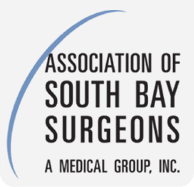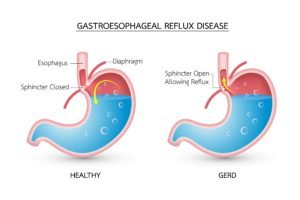Gastroesophageal Reflux Disease, commonly known as GERD, causes some major problems with digestion and overall health. The Association of South Bay Surgeons helps patients deal with the most severe cases of GERD that require specialized surgical correction. To learn more about how surgical intervention can help GERD, contact the offices today.
GERD Q & A
GERD otherwise known as reflux or heartburn is a common condition affecting one of every five Americans. Reflux is when acid from the stomach enters the esophagus (the tube that connects the mouth to the stomach) There can be many conditions that cause this. Most commonly is lower esophageal sphincter weakness that does not provide an adequate pressure valve preventing stomach fluid from entering back into the esophagus. (Please see the diagrams below) There are many medications that can treat the symptoms of reflux disease. Medications like Tums, Zantac or Prilosec do help symptoms however these medications do not correct the problem. These medications you will have to take life long and are not without long-term risks. Long term acid exposure to the esophagus can lead to cancer. If you have symptoms of reflux or heartburn or are on medications seeking another treatment please give us a call for a prompt evaluation. There is a way to live without medications and symptoms of heartburn.
- Obesity
- Pregnancy
- Autoimmune diseases/Connective disease disorders
- Hiatal hernias (slipping of the stomach into the chest)
- Smoking
- Eating too much and too quickly
- Lying down too soon after eating
- Taking nonsteroid medications like Advil, Motrin, Aspirin
- Drinking coffee, carbonated beverages, alcohol

- Burning sensation in the back of the throat or chest
- Hoarse voice
- Bitter taste
- Dry cough
- Nausea, vomiting and regurgitation
- Worsening asthma symptoms
- Medical management with the use of medications such as Zantac or Prilosec. Long term use of these medications can lead to osteoporosis, dementia, vitamin/mineral deficiencies, kidney disease, and increase risk for serious bowel infections (C. Dif Colitis)
- Surgical repair. Depending on whether the stomach is in its normal position or has slipped into the chest will determine how to recreate the valve preventing acid from escaping the stomach into the esophagus. The goal of surgery is creating the valve. This can be done by wrapping the stomach around itself called a fundoplication or with titanium-link magnet beads called LINX.
Reflux surgery is done by laparoscopic (keyhole) technique with small incisions and a video camera. Surgery takes about 1-2 hours and requires 1 to 2 days in the hospital.
Patients usually return home 1-2 days after surgery. All patients will be on a modified liquid diet for 1-2 weeks during the recovery process and the diet advanced to normal shortly thereafter. Most patients have mild surgery incision site pain and muscle discomfort lasting 3-5 days and usually resume full physical activity within 4 weeks.






Leave a Reply